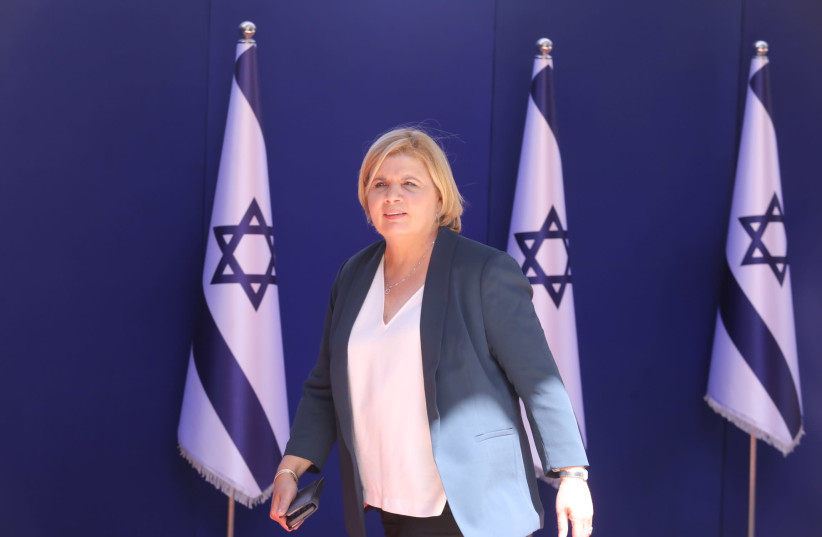Voters turned out in low numbers on Tuesday’s municipal elections, as Israelis headed to the ballot boxes amid its war against Hamas in Gaza.
Polls closed at 10:00 p.m. and results were due only after press time. However, according to an update by the Interior Ministry unit responsible for the election, by 10:00 p.m. approximately 3.5 million Israelis, or 49% of eligible voters, had cast their votes – compared to 56% at the same time in the peacetime municipal elections in 2018.
This tally does not include voting by IDF soldiers, which is expected to be far more numerous than in 2018 due to the many reservists currently on duty. The difference between voter turnout on Tuesday and the previous vote in 2018 is therefore not as large as the 8:00 p.m. numbers suggest – but still on pace to be significantly lower.
Among Israel’s big cities, Bnei Brak led at 7:00 p.m. with 51% turnout; Ashdod followed at 39%; Tel Aviv at 35%; and Haifa at 33%. Jerusalem was far behind, at 25%.

Tel Aviv election: Will Ron Huldai be ousted as mayor?
Israeli ministers and Knesset members gave statements to the press as they cast their votes throughout the day.
Opposition leader and Yesh Atid chairman Yair Lapid in Tel Aviv expressed his support for former Yesh Atid minister Orna Barbivay, who is running against incumbent mayor Ron Huldai. He called her “the greatest manager I have met in my life.” In a statement late Monday night, Lapid said that Yesh Atid had 60 candidates running in municipal elections throughout the country.
“The municipal elections are important like never before. Municipalities have faced five years of enormous challenges – a worldwide pandemic, unstable governments, judicial reform, and a difficult war with challenges at the front and on the home front,” Lapid said. In a press conference on Monday, he also argued that the decision to hold municipal elections during wartime showed that it was possible to do so.
Labor chairwoman Merav Michaeli expressed support for Tel Aviv Mayor Ron Huldai.
“I wish there [were] a candidate for prime minister whom I trust and who works for the good of my country like Huldai works and has worked for my city,” Michaeli wrote on Twitter.
“I take great comfort in the fact that he is the mayor,” she added, before expressing her opinion on the current situation. “In the days of this terrible war, we saw how important stability and a safe and trustworthy hand on the wheel are... this is the man you can trust to protect [...] our values and rights,” Michaeli wrote.
United Torah Judaism’s Uri Maklev, Deputy Transportation Minister and Deputy Minister in the Prime Minister’s Office, voted in the Jerusalem neighborhood of Ramot, despite being in mourning for his father, who died earlier this week.
“We left the sorrow and mourning at the directives of our rabbis. The election is not just a civil matter, but a mission to influence very important, principled, and spiritual things … with God’s help, we will succeed,” he said.
Nearly all of Israel’s parties had representatives running in the municipal election, and many, such as Religious Zionist Party chairman Bezalel Smotrich, made numerous statements during the day urging voters to head to the ballot box.
The Hostages and Missing Families Forum, in raising awareness of the hostages still held captive by Hamas in Gaza, said they would be active at 134 polling stations throughout the country, corresponding to the number of hostages still held captive and indicating that the hostage who was supposed to cast a ballot was denied the ability to vote. The organization paraded with signs saying: “Vote for the hostages!”
President Isaac Herzog cast his vote earlier on Tuesday in Jerusalem. “Local government impacts our lives in a very dramatic way,” the president said. “Every area of life for the citizens of Israel is cared for by local authorities. Therefore, if we want to influence the direction of our lives, it is best to go out and vote in the local authority elections. “This has been proven all the more so in the war, in a state of emergency, we see the municipalities, the local authorities, and councils handling and facing a host of challenges of the highest importance,” Herzog said.
Herzog called on all Israelis to vote and added that voters should treat the families of captives being held in Gaza with love.
“Please, approach them, hug them, empathize with them, and express the sense of brotherhood and solidarity, of mutual responsibility for all Israel, for there is no greater mitzvah than redeeming captives,” Herzog said.
